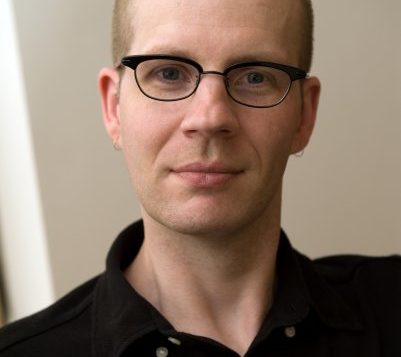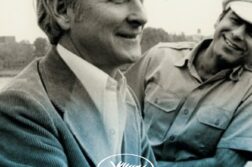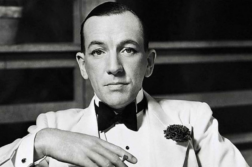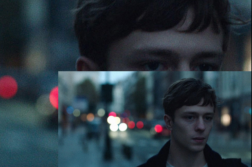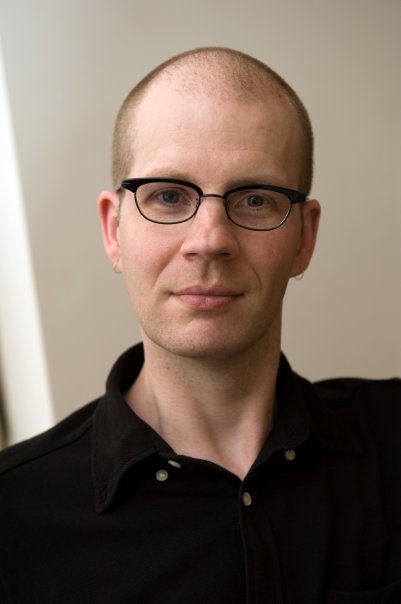 Marshall Moore is an American author, publisher, and academic based in southwestern England. He has written several novels and collections of short fiction, the most recent being Inhospitable (Camphor Press, 2018) and his memoir, I Wouldn’t Normally Do This Kind of Thing, being published soon by Rebel Satori Press . His essays and short stories have appeared in The Southern Review, Asia Literary Review, Litro, Quarterly Literary Review Singapore, The Barcelona Review, and many other journals and anthologies. Forthcoming books include Blood and Black T-Shirts, an account of living through the 2019-2020 protests in Hong Kong; and Love Is a Poisonous Color, a new collection of short stories. He is also the co-editor of three academic books on the subject of creative writing and publishing. He holds a PhD in creative writing from Aberystwyth University in Wales, and he is a course leader and senior lecturer on the creative writing program at Falmouth University in Cornwall.
Marshall Moore is an American author, publisher, and academic based in southwestern England. He has written several novels and collections of short fiction, the most recent being Inhospitable (Camphor Press, 2018) and his memoir, I Wouldn’t Normally Do This Kind of Thing, being published soon by Rebel Satori Press . His essays and short stories have appeared in The Southern Review, Asia Literary Review, Litro, Quarterly Literary Review Singapore, The Barcelona Review, and many other journals and anthologies. Forthcoming books include Blood and Black T-Shirts, an account of living through the 2019-2020 protests in Hong Kong; and Love Is a Poisonous Color, a new collection of short stories. He is also the co-editor of three academic books on the subject of creative writing and publishing. He holds a PhD in creative writing from Aberystwyth University in Wales, and he is a course leader and senior lecturer on the creative writing program at Falmouth University in Cornwall.
Below is a longer version of an interview that I and Marshall did recently by email. A shorter edited version will run in The G&LR‘s Jan-Feb 2023 Issue.
Trebor Healey: I loved your new book, which was a major departure for you. Why a memoir after almost three decades of writing dark fiction?
Marshall Moore: Time, and timing. To understate the case a bit, I’ve had an unusual life, the details of which have always been there between the lines of my fiction, never explicit. I had begun to think that for my fiction to mature further, perhaps I ought to deal directly with the story about my life, to get that out in the open. Besides, I’d just finished my PhD, the creative component of which was a novel. I wanted to write something other than fiction after that. Those batteries were drained dry. Once I started writing the first chapters of the memoir, the thing more or less wrote itself.
TH: I love the title: I Wouldn’t Normally Do This Kind of Thing, and while I know it’s the title of a Pet Shop Boys song, why did you choose it, and of course tell us about your youthful musical interests.
MM: I’ve been a fan of the Pet Shop Boys since my teens, but I chose the song because the title fits the book so well: I spent a great deal of my youth attempting to be “normal,” whatever that is. Plus, I was really into music back in the ‘80s (it was arguably better then): Eurythmics, OMD, New Order, Depeche Mode, Kate Bush, Grace Jones, Roxy Music, Duran Duran, Siouxsie & the Banshees, Echo and the Bunnymen, that kind of thing. But to bring this back to the title, it’s meant to be self-effacing, almost an excuse for doing something odd or out of character. I’ve been a fiction writer for so long, and here comes this dark and messy memoir. If you’ve read my work at all, it’ll explain a lot.
TH: Your memoir is dark, but it’s often wickedly funny too. Is humor a consolation for the insanity you endured?
MM: People tell me I’m funny sometimes, but I tend to think it’s mostly gin and social awkwardness. More seriously though, there’s humor and there’s wit. I didn’t put them in to offset the more unpleasant parts of the story. That’s just how my mind works. I think in subtle puns and arcane literary references and whatnot, and it’s not even deliberate.
TH: There’s definitely what I’d call a Southern Gothic flavor to your family on both sides, but I suppose especially in your father’s case, where it gets downright Faulknerian. I’m not a Southerner so maybe you can explain this and how its informed your voice as a writer?
MM: The tragedy in my father’s family—I shouldn’t say what it was, because spoilers—hung over everything, always, and yet when I was a kid, my sister and I weren’t allowed to ask about it. Our mother was determined that we talk to him as little as possible. I don’t think the term PTSD had been coined yet, but he clearly had it. We always knew something awful had happened, over and above the trauma he endured in Vietnam, and that’s perhaps the most Southern Gothic part of all this: having a huge, terrible secret hanging overhead, and for a long time not being sure what had really happened. I’ve always written about people who have survived trauma. Not too hard to see where it comes from, and it might put my shift to writing nonfiction into better perspective.
TH: You also discuss the plight of the bright kid in an unstable home and amidst the banality of school, and how that can lead to trouble. How does a smart kid navigate the madness of childhood?
MM: High intelligence is increasingly talked about today as a borderline disability; I’ve seen the word “comorbidity” used in those discussions. It ought to be obvious that it’s not a disability, it’s a gift. When you have a gift like that, your parents and teachers expect more and have less tolerance for mistakes. At the same time, if you’re a year or two younger than your classmates, which I was, the emotional maturity is not there yet, however well you’re hung between the ears. The problem isn’t with the bright kid, it’s with the inadequate support systems. I suppose it’s better today, but in mid-’80s North Carolina, not so much. I went off the rails, not to the Ivy League. In some ways, kids today have it so much better than we did: there’s more understanding of cognitive functioning, sexual and gender identity, neurodiversity, that kind of thing. There’s a lot more support. At the same time, kids who stand out still get bullied, and they’re vulnerable to abuse online in a way that we never were. I don’t know that I have any answers, really. Did I even navigate childhood? I think I sort of shipwrecked, washed ashore, and found a cave.
TH: Your parents were clearly wounded people, which put you and your sister in a difficult situation. How do you see them now after all these years and the added perspective that comes with adulthood?
MM: That’s just it: they’re both very wounded people, and what happened to them was not their fault. At the same time, they were too damaged by their circumstances to be good parents. They could barely function. The lights stayed on and there was food on the table, so there was always the pretense of being a typical middle-class family. We weren’t, though, and there was no way things were going to end well for any of us. I spent years being the one in the middle, the one holding things together for everyone else despite the contempt and disapproval directed at me then and since. Now that I’m a middle-aged adult, I wouldn’t say I’m bitter about my life: I’ve made the most of what I’ve been given. I’ve made it work, more or less. But I also prefer to keep my distance.
TH: There are of course issues around your sexuality and your youthful explorations. Tell us about your confusion and struggles at that time.
MM: I think it was good old-fashioned Southern homophobia with a big dollop (maybe the whole bottle) of mental illness mixed in. Being a closeted kid and coming out back then—honestly, I don’t think my experience was that different from what a lot of people went through, at least in the sense of finding out what my authentic self looked like. People seemed to deplore my speech and mannerisms and gait and pretty much everything else. It took getting out of North Carolina and meeting men who didn’t define themselves by violence and machismo to kind of settle into myself, so to speak. The problem wasn’t me, it was the assholes I’d grown up around. In my mid-20s, I was just barely beginning to learn how to move through the world without panicking over every word I said and every step I took.
TH: This memoir ends in your early twenties as you’re first set free, in a sense, from your family of origin. You’ve done and accomplished a lot since. Will there be a second memoir, or do you have a preference for a particular genre at this point?
MM: Yes and no. My next book is also a memoir of sorts: Blood and Black T-Shirts: Dispatches from Hong Kong’s Descent into Hell 2019-2020. I was in Hong Kong through all the horror and violence of that period, and the book started life as my Facebook posts about it. What happened there was a nightmare, far worse than people elsewhere may have picked up from the headlines. An editor friend insisted that I compile and expand the posts into book form, and she actually pulled the initial manuscript together for me. At the time, I couldn’t reread that stuff without sobbing. I can deal with it better now, but it was a traumatic time. Camphor Press, who released my novel Inhospitable a few years ago, will publish it probably in 2023. Also, I’ve begun writing essays—creative nonfiction—and exploring some of my later experiences in essay form, story by story rather than as a single narrative. There’s already a book-length collection of them, Sunset House, making the rounds with publishers and agents. I’m hoping it will get published sooner or later. I think I might prefer the essay form now; I don’t see myself writing another memoir per se, or at least not yet. I’m far from done with fiction, though: I’m almost done with a new novel and hope to knock that out this year. It’s been a long slog.
TH: That’s interesting and I think a lot of writers are feeling that way these days with all that’s going on. It feels like a time to speak out, to stake one’s ground as we drift toward Yeats’s prophetic fear that ‘the best lack all conviction, while the worst, is full of passionate intensity.’ Essays suggest convictions and demand a kind of clarity while fiction demands upon interpretation and patience, which seem in short supply. It poses the question of what is a writer’s responsibility in these times? So, what kinds of essays are you writing?
MM: I’m leaning toward semi-lyrical—although I’m not one to go overboard with really beautiful prose in any deliberate way—memoirish pieces that identify and examine the various threads in my life. I’ve written a lot already about the events in Hong Kong. Partly that’s a political act: telling the truth about what happened there is probably a violation of the National Security Law, which I have no intention at all of obeying. I’m in a position to speak out. I see that as my responsibility, and I’m going to continue doing it relentlessly. I will not be silent about what happened there: to me, to my partner, to our friends and colleagues, to my students, to the people in the city. But I can only tell and retell that story so many times. Apart from that, my focus is mostly inward: looking at the patterns that have emerged and finding ways to write about them.
TH: You’re also a publisher and a professor, a writer of essays and articles in addition to being a book author. How do you juggle all that and how does it inform your own writing?
MM: I’ll admit, it’s harder than it used to be. I’m in a more senior teaching/management position now, so there are more demands on my time. Sometimes I think I’m in for a light day, and then I open Outlook and Teams and flinch as my whole afternoon gets incinerated by the fires I have to put out. At the publishing house, we are strict about the number of books we release and the amount of editing they require. I used to be willing to spend hours on heavy edits. No more. If a manuscript isn’t pretty close to pristine, we can’t accept it. I do make time to write, and I’m used to writing in dribs and drabs. Somehow I manage to get it all done, eventually, sort of—albeit not always as fast as other people would like. If there’s a secret to it, it’s giving myself time to be idle and not feeling guilty about it. I can get a lot done in a short time, and I have intense focus. Then I’m fried afterward and I have to let the batteries recharge.
TH: What are your thoughts on the current state of LGBT literature and do you have any favorite recent books you’d like to discuss?
MM: It feels like queer lit has finally reached the place we were hoping it would, back when our own writing careers were starting out: the glass ceiling may not be gone altogether, but it’s a hell of a lot thinner than it used to be. You can be out and write a very gay-themed book and get a major book deal and get fantastic reviews from the top trade publications. I read PJ Vernon’s Bath Haus recently and loved it, not just for what it was but for what it represented. It was a very tense domestic thriller and quite well written apart from a few younger-writer quirks I hope he’ll outgrow. When my first novel The Concrete Sky was published about 20 years ago, that was the kind of success I was hoping for, but obviously it was out of the question—not because of the merits of the book or lack thereof, but because of The Gay Issue. I was led to believe no major publisher would touch it. In retrospect, that might have been naive of me. But it’s not an issue today, not really, not as much. So I think it’s great that writers like Vernon and Eric LaRocca (whose novella Things Have Gotten Worse Since We Last Spoke grossed me out and amazed me at the same time) are out there now, and that there are so many out writers that you can’t keep track of them all anymore. It’s a welcome change.
TH: Yet sometimes I think big publishers prefer gay books written by non gay authors (Hanya Yanagihara comes to mind). What are the hazards for LGBT writers starting out today?
MM: I suspect Yanagihara was more of the exception than the rule. Literary Twitter is quick to scold careless appropriation, although the risk there is that Twitter pile-ons get ugly fast and sometimes over something that was taken out of context. If you erred in some way and are trying to apologize, even your word choices in the apology will get torn apart if someone’s suitably worked up. That’s one of two big concerns. The other is the prioritization of representation over good writing and editing. Of course representation is important, and publishers are right to hesitate when an author is writing outside of what appears to be lived experience. But I also see a shift in attitudes toward writing: it’s becoming seen as a service rather than an art form, and outcomes like social justice and improved mental health are attached to it from the start rather than viewed as benefits that may ensue. This leads to readers having very personal, very granular, and very unrealistic expectations. And to be honest, I think writing is something you offer, not impose. I don’t presume to be anyone’s spokesman. If someone looks up to me because of my work or how I’ve lived my life, that’s an honor. If someone reads my work and feels seen or spoken to, likewise. But I offer that; I don’t put myself forward as anyone’s role model, and I think there’s a subtle arrogance when writers take that posture by putting representation ahead of the actual work. It’s either that or they’re just naive.
TH: Do you have a favorite book among your many? And can you tell us what you were going for book by book if that’s possible to lay out in a concise manner?
MM: I think they’ve all turned out well, but they’re very different books. I hit a nerve with The Concrete Sky when it was published. It’s more commonplace now to see Generation X discussed as the first in US history to be worse off than our parents. Collin Kelly was the first to point out how much anger there was between the lines of that book. I hadn’t thought of it that way until he mentioned it, and I think he was right. I was trying to articulate a certain terror and desperation about the future, as well as a rock-hard refusal to keep my head down, play by the rules, and hope things would turn out for the best. The Infernal Republic is a strong collection of short fiction. The others (I’ve just sold collection #4, Love Is a Poisonous Color) are good too, but this one resonated with people for some reason. Inhospitable, the novel I wrote for my PhD, was the book in which I really matured as a writer. My first academic book, The Place and the Writer, has opened a lot of doors professionally, and internationally. Conferences and such. And I hope I won’t jinx myself, but Winterville—the new novel, which I’m almost finished writing—feels special somehow. It’s the biggest and most ambitious thing I’ve done (well, apart from finishing a PhD inside of three years while holding down two jobs and running a business on the side) and I hope the risk will pay off.
TH: Let’s talk about hanging in there, i.e. longevity. We’ve both been at this for 30 years give or take. Not everyone keeps writing as the remuneration is increasingly next to nothing for midlist authors, to say nothing of the elusive nature of fame or influence. And like me, you like the short story form. While I think it’s more popular now, it has never been able to compete with the novel in the American market, even though I think far better work is done there. It’s easy to get discouraged. What keeps you writing and how do you get through those dark periods where it seems futile?
MM: By being a fucking bulldozer. I’ve had short stories collected in a couple of those “hot young writer” anthologies that come along from time to time. A few weeks ago, I got curious and looked through one of them. Half the writers in it seemed not to be still active. That says a lot. I’ve known since I was a kid that I was a writer. It became clear early on. That clarity was a gift. In my teens and twenties I had my dreams and delusions of fame, and the fact that things worked out differently was another gift. It took me years to see that. Early success of that magnitude rarely seems to end well for writers. A lot of them don’t go on to have careers. Plus, I’m pretty relentless in a quiet way. This is possible because I know I’m playing a long game. I’ve always known that. To that end, I’ve pursued jobs and an education that would keep me employed, give me time for other pursuits, and make me a better writer. We could easily name a dozen writers each who’ve given up along the way, either because they didn’t end up rich and famous, because they got fed up with the glass ceiling, because their publishers dropped them, you name it. You have to decide what success means to you, what it looks like, and keep revisiting that definition. Do I want to be rich and famous? In today’s world, of course I’d like to have more money but I’m more comfortable than I used to be. Famous? Hard pass. I’d enjoy a bit more visibility and readership than I currently have, but there’s a toxicity to fame today that looks like it would overshadow the fun parts. And the point is, there’s more than one way to be a successful writer. Staying in print, even at the margins, is hard. You can build your life around it—I certainly have—without having to rely on it to pay the bills. In a way, that’s more freeing. And here we both still are, 30 years later.
TH: Though ‘here’ has repeatedly changed for both us. As another on-and-off expat, I’m curious about your life abroad. Give us a synopsis of all the places you’ve been and lived and how that has affected you as a writer.
MM: On some level, I’ve known since I was a kid that I’d end up moving overseas. I can’t point to a specific reason, only that the hunch was there, or the interest, or the compulsion. Asia made sense to me because I was changing careers, getting into teaching. Korea and Japan were the best places to do that at the time. My original idea was to go to Japan, maybe a regional city like Fukuoka or Matsuyama, but I ended up in the Seoul suburbs. It was tough at times, but there were parts that were great as well. After three years, I was ready to move on, so I started looking for jobs in Hong Kong. I spent the summer in Bangkok doing a teaching certificate program, then spent my first month in Hong Kong in a tiny hotel room while I searched for an apartment. I was there—Hong Kong, not the tiny hotel room—for twelve years, so I had time to travel in the region. Now I’m in the UK, not a place I expected I’d end up at all. I like it here, even if Brexit, the pandemic, and the Tories have made a mess of things. The biggest effect living abroad for so long has had on me as a writer has been marketability. US publishers and agents generally don’t know what to do with me. I’m not sure British ones do either. I’ve always been too gay for lit fic and horror, too dark for queer lit, and now I’m either too American or not American enough. I’m in Britain but I spell “color” without the U. It’s always something. But moving overseas has meant I’ve had access to health care and economic opportunities. I’ve stayed employed. Been able to pay cash for a master’s and a PhD. No student loans. No significant debt. None of what I’ve accomplished would have been possible in the US, and I think it’s finally become socially acceptable to point out that America stopped being the Land of Opportunity a few decades ago, at least if you’re from there and not already rich.
TH: Where are you in the UK, and what are your current projects and plans?
MM: I’m down in Cornwall. If you look at a map, it’s at the end of the peninsula that sticks out to the southwest, into the Celtic Sea. Truro, where I live now, isn’t right at the tip of the peninsula. More like the frenulum. I feel incredibly lucky to be here. Even though the country’s a bit of a shambles, it’s a lovely shambles and a pretty good place to live. I love the weather and the scenery, and the people are terrific except when they’re assaulting you. I’m busy with my teaching job and Signal 8 Press, but I’m still managing to write. I’ve got another co-edited academic book coming out in 2023, and I’m hoping Sunset House will see publication next year as well. I’ve got a few books under contract, and there’s the novel. Those are the bits I’m more certain of. Beyond that, a few other projects are taking form, although I’ll be pushing 60 before they see the light of day!
For more information about Marshall Moore, visit his website or follow him on Twitter at @marshallsmoore.
Trebor Healey, a contributor to The G&LR, is an author, most recently of the short story collection Falling (Wisconsin, 2019). For more info about and writings by Trebor, visit his blog.


